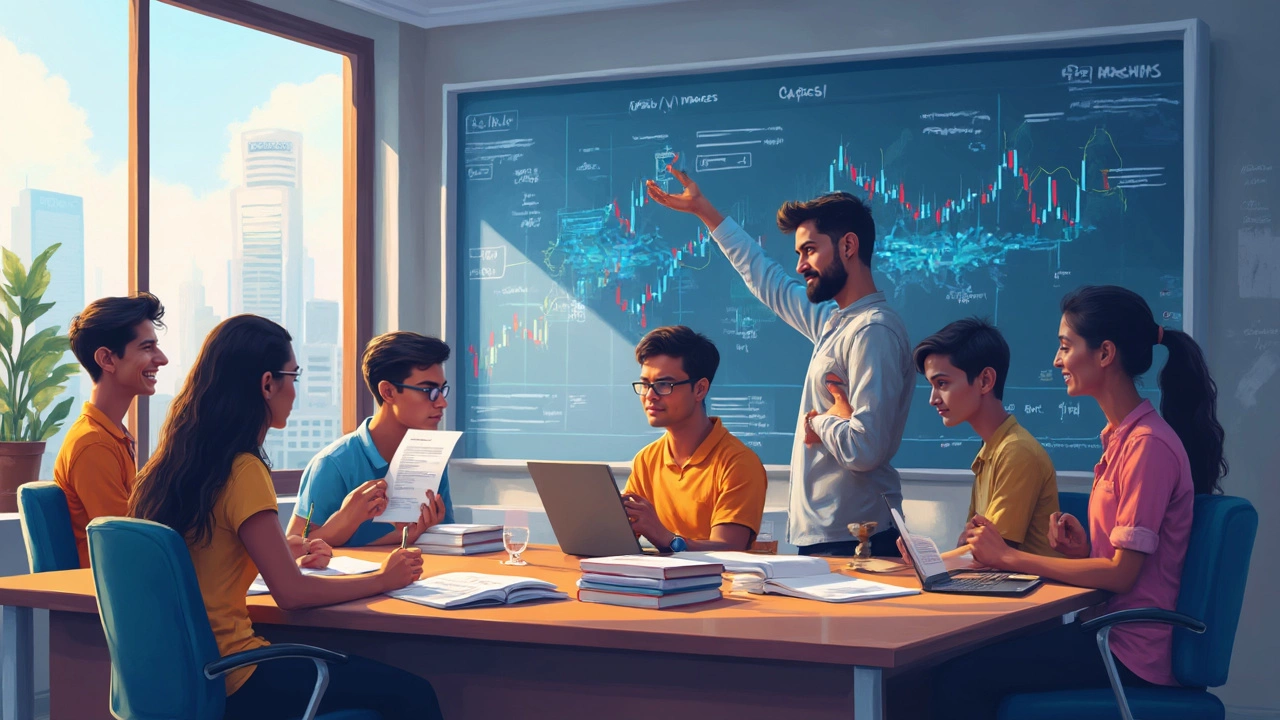Best Degree for Trading: Your Guide to Trade Courses in India
Most people assume you need a finance degree to get into trading, but reality isn't that simple. Banks and trading firms look for sharp minds, strong analysis skills, and nerves of steel—you can't learn all that inside a classroom.
Here's what you really need to focus on: understanding how markets work, reading charts, making decisions fast, and managing risk like your paycheck depends on it (because, for traders, it usually does). The right degree can help, but it won't do the heavy lifting for you. Some folks crack it from engineering backgrounds or even computer science, simply because they know how to solve problems and think logically.
If you're serious about trading in India, don't just look at the usual options. There are hands-on trade courses popping up everywhere—from NSE Academy to popular programs at BSE Institute. These aren't like regular college classes either; they're built to get you market-ready, sometimes in just a few months.
- What Makes a Degree Good for Trading?
- Finance, Economics, or Something Else?
- Specialized Trade Courses You Can Take in India
- Certifications That Impress Trading Firms
- Skills That Matter More Than Degrees
- Smart Tips For Aspiring Traders
What Makes a Degree Good for Trading?
The truth is, it's not about picking the "perfect" degree. It's about stacking up real-world skills that actually help you make better trades. A good degree for trading should boost your understanding of how money moves, what makes prices swing, and how emotions play out in the markets.
If you're eyeing jobs with big banks, prop trading firms, or brokerage houses in India, here are some factors that matter more than just the name of your degree:
- Trading degree programs that teach market analysis, risk management, and financial modeling are big plus points. But don't ignore the value of hands-on, live trading assignments or case studies.
- Degrees that include economics, statistics, or computer science shape your thinking for trading: you learn to crunch numbers, spot trends, and act on good data.
- Don’t underestimate soft skills—degrees with presentations, team projects, or negotiation practice help you stay cool under pressure and pitch ideas fast.
- If you’re into technical or algorithmic trading, anything with coding—like computer engineering or data science—can give you an edge. Python, R, and Excel are the usual suspects.
Some folks swear by short courses and online certifications rather than a full-blown degree. But if you want recruiters to notice, a bachelor’s in finance, commerce, or even math sends the right signals.
| Degree | Typical Skills Learned | Chance of Getting a Trading Job |
|---|---|---|
| Bachelor’s in Finance | Risk analysis, market operations, investment principles | High |
| Bachelor’s in Commerce (B.Com) | Accounting, basics of economics, business math | Moderate |
| Engineering/Computer Science | Problem-solving, coding, quantitative methods | Moderate to high (if you learn trading on the side) |
| Economics/Statistics | Data crunching, big-picture market ideas | Moderate |
| Short-term Trading Course | Practical trading, live simulations | Entry-level jobs or self-trading |
At the end of the day, a degree is your launchpad. But the real edge? Building solid market knowledge, staying curious, and learning from real trades—not just textbooks.
Finance, Economics, or Something Else?
If you're hunting for the best trading course, your first instinct might be to sign up for a finance or economics degree. Both are solid choices, no doubt. A finance degree teaches you about money markets, investment strategies, and risk management—the same stuff pros use in trading floors. Economics, on the other hand, is all about the bigger picture: how markets move, why prices shift, and what makes an economy tick. These subjects help you build a strong foundation for trading stocks, currencies, or commodities.
But here's a twist: neither path is the only way in. In India, many top traders come from engineering or math backgrounds. Why? These degrees teach problem-solving, data analysis, and coding, which are incredibly useful in today's algorithm-heavy markets. Hedge funds and trading firms often hire engineers because they bring fresh ways of looking at numbers and building new trading tools.
Don't ignore newer options like computer science either. The rise of algo-trading (where bots make quick-fire trades using code) is huge in India. If you can program and understand market logic, you can carve a special niche for yourself, especially with the demand for quant traders going up every year.
So, which path should you choose? Here’s a quick breakdown:
- Finance: Best if you want a direct shot at learning market structures, portfolio management, and investment analysis.
- Economics: Go for this if you like big-picture thinking—predicting trends, understanding macro policies, and doing research.
- Engineering/Math/Computer Science: Smart move if you're logical, good with numbers, or want to get into algo-trading or data-heavy strategies.
And honestly, it’s not just what you study, but how much you dig into practical skills. The real world cares about results. Supplement your degree with courses in technical analysis, coding, or risk management—they make a difference when you actually start trading.
Specialized Trade Courses You Can Take in India
If you want to skip the endless theory and jump right into trading, India offers some killer options. Specialized trade courses cut the fluff and focus on practical skills—stuff you'll actually use on the trading floor or in your own portfolio.
The big names are familiar: NSE Academy and BSE Institute. Courses here aren't just about stocks—they also cover options, futures, currency, and commodities. And the coolest part? Both give you exposure to live market scenarios using real-time data. If you’re after a trading degree that speaks the market’s language, this is where you start.
- NSE Academy’s Certified Market Professional (NCMP): Designed for beginners and those wanting to brush up, this gives you basics like technical analysis, risk management, and trading psychology. You get a certificate recognized across the industry.
- BSE Institute’s Certificate Program on Capital Markets: Known for being hands-on, it covers everything from stocks to derivatives. The batch sizes are usually small, so instructors can actually focus on you and your trading style.
- National Institute of Securities Markets (NISM): Their ‘Certified Derivatives Professional’ and ‘Investment Adviser’ courses are pretty rigorous. Expect a good mix of online content and case studies.
- Online Platforms (like Zerodha Varsity and UpGrad): These are way more flexible—learn at your pace, fit around your job or college, and pick niche topics like algorithmic trading or data-driven investing.
Check out this breakdown of popular trade course fees and durations:
| Course | Provider | Fee (INR) | Duration |
|---|---|---|---|
| NCMP (Level 1-4) | NSE Academy | 5,000 - 18,000 | 1-6 months |
| Capital Markets Certificate | BSE Institute | 12,000 - 35,000 | 2-6 months |
| Certified Derivatives Professional | NISM | 1,800 - 2,500 (Per Module) | Self-paced |
| Online Stock Market Program | UpGrad | 7,500+ (Varies) | 1-3 months |
Pro tip: Actual trading experience matters as much as the certificate. Pick courses that include live trading sessions, workshops, or internships. Nothing beats seeing your own money move with the market—win or lose, you’ll learn fast.

Certifications That Impress Trading Firms
If you're trying to stand out in trading, nothing shuts down doubts faster than solid certifications. Trading firms in India take these seriously—not just as a checkbox, but as proof you've tackled practical finance skills and know what you're doing.
Most-recruited traders have at least one of these under their belt:
- NISM (National Institute of Securities Markets) Certifications – From the ‘Series VIII: Equity Derivatives’ to ‘Series XV: Research Analyst’, these exams test you on real market knowledge. For retail and institutional trading jobs, NISM certs are baseline requirements. Out of all the options, the Equity Derivatives and Research Analyst modules are heavily preferred in interviews.
- NSE’s Certified Market Professional (NCMP) – Awarded after completing various NSE Academy modules, this one is prized for showing hands-on market understanding. Recruiters like seeing at least Level 1, but Level 4 gets serious respect.
- Chartered Financial Analyst (CFA) – Probably the toughest finance exam globally, CFA covers everything from ethics to portfolio management. More hedge funds and broking houses in India now shortlist candidates with CFA Level I or above. (Fun fact: Less than 20% of candidates in India clear all three levels.)
- Chartered Market Technician (CMT) – This one’s for people who live and breathe charts. If you want to go into technical analysis, a CMT is gold. Most prop trading desks love to see this next to your name.
Some stats worth knowing:
| Certification | Typical Cost (INR) | Exam Duration | Job Roles Suitable For |
|---|---|---|---|
| NISM Series VIII | 1,500 | 2 hours | Trader, Dealer |
| NSE NCMP (Level 1) | 2,000 | 1.5 hours | Market Analyst, Trainee |
| CFA Level I | 70,000 | 6 hours | Equity Research, Portfolio Analyst |
| CMT (Level 1) | 30,000 | 2 hours | Technical Analyst |
Quick tips? Put your most recent and toughest certifications up top on your CV. If you’re juggling time and money, start with the NISM modules—they’re affordable, recognized, and sometimes compulsory if you want to officially deal in Indian markets. Stacking these along with a trading degree or relevant course instantly boosts your chances with any trading desk.
Skills That Matter More Than Degrees
Here’s the truth a lot of colleges won’t tell you: the market doesn’t care about your degree on paper, but it does care if you can stick to a plan when things get wild. If you want to stand out in the world of trading, these skills beat a fancy certificate every time.
- Risk Management: If you ask any pro trader what keeps them in the game, they'll say knowing how much to risk per trade. It's common for even skilled traders to lose on 40% of their trades, so being able to limit losses keeps your account alive.
- Emotional Control: No degree teaches you not to panic when the market crashes. Top traders develop thick skin. They don't chase after losses or get greedy when things go well.
- Critical Thinking and Fast Problem-Solving: Markets move in seconds. If you hesitate, you lose. Traders who think fast and adapt win more than those who just follow a formula from class notes.
- Technical and Analytical Skills: Knowing how to read price charts, spot patterns, and crunch numbers matters more than memorizing theory. Tools like Excel, Python, and charting software give you a real edge.
- Continuous Learning: Markets change fast. The best traders keep learning—watching economic news, following global trends, and testing new strategies always pays off.
If you look at where successful traders come from in India, you’ll find engineers, business grads, and even math wizards—many with no direct finance background. In 2023, a survey by the NSE Academy found that over 30% of new, profitable Indian traders had degrees outside finance or economics. What made them stand out was how quickly they picked up new skills and used modern trading tools.
| Skill | Why it Matters | Can You Learn It In a Degree? |
|---|---|---|
| Risk Management | Survives bad trades, protects your capital | Rarely |
| Emotional Control | Stops panic and poor decisions | No |
| Chart Analysis | Spots good trades faster | Sometimes |
| Programming/Automation | Back-test ideas and trade fast | Optional/Elective |
| Adaptability | Keeps you sharp as markets change | No |
The path to becoming a successful trader is less about your college degree and more about building the skills that help you handle risk and act quickly. Focus on these, and you’ll do better in any market—degree or not.
Smart Tips For Aspiring Traders
If you want to break into trading—whether it’s stocks, forex, or commodities—everyone says the same thing: learn by doing. This sounds simple but it’s the fastest way to get your hands dirty and really see how the markets work. You can open a demo account with almost any broker in India—Zerodha and Upstox are two of the most popular—and practice for free before you put any real money on the line. Treat those trades as if the cash is yours and watch how your emotions react.
Don’t ignore the power of community. Join discussion forums, Telegram groups, or even follow Indian trading YouTubers who break down strategies in real time. You’ll pick up tips that no textbook covers and see what’s tripping up other beginners. Don’t be shy; asking questions here often saves you from costly mistakes.
- Never stop tracking your trades. Make a habit of writing down every trade you make—why you did it, how you felt, and what happened. Apps like TraderSync or just a simple Excel sheet work great. Looking back, you’ll spot patterns in your own thinking faster than you expect.
- Invest in learning before investing huge sums. Besides college degrees, check out short, focused trading degree programs from well-known places like NSE Academy or BSE Institute. Many Indian traders boost their skills through online courses from Coursera or Udemy and even pick up certifications that beef up a resume.
- Always stay updated. The Indian market changes fast, and regulations shift often. Set up alerts for RBI, SEBI, and market news. If you ever trade based on stale information, you’re basically guessing.
Lastly, be patient with yourself. Most first-time traders lose money, but the folks who stick with it, fix their mistakes, and learn from others—those are the ones who actually make it in this business. And remember: It’s way smarter to start slow and protect your capital than to take wild risks chasing that quick win. That’s basically a trader’s golden rule.





